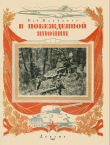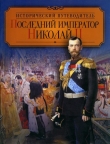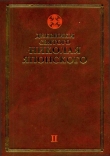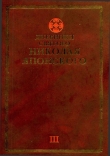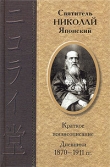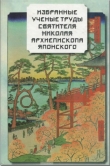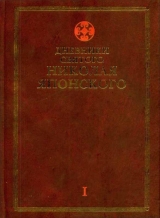
Текст книги "Дневники св. Николая Японского. Том Ι"
Автор книги: Николай (Иван) Святитель Японский (Касаткин)
сообщить о нарушении
Текущая страница: 6 (всего у книги 39 страниц)
The elite group of the students at the Theological Academy in the capital city of Russia were, although belonging to the naturally conservative world of the Orthodox Church, a kind of intelligentsia who had acquired high culture, had a good knowledge of European languages, and were well read in politics and ’belles lettres’.
Thus they were quite aware of the backwardness of their own country.
The application of elite students for the small post of chaplain in Hakodate clearly shows that they were influenced by the idealistic expectations of the 1860s. Though they were theological students, they were contemporaries of and held the high idealistic view of life in common with ’ Men of the 1860s (’Shestideshatniki’), the democratic writers noted for their criticism of the old regime of Russia.
In February, 1869, about eight years after his arrival in Hakodate, Nikolai published a long report entitled «Japan Also Will Be Fruitful – A Letter of a Russian in Hakodate» in Khristianskoe chtenie (The Christian Reading), in which he wrote: «Eight years ago I declared my wish to accept the post of chaplain of the consular church here with a missionary purpose. Who among the students at the Theological Academy would be determined to come here only in order to serve in a church, which is often completely empty, as there are not more than ten Orthodox Russians including babies here? At that time, by the way, there was much discussion about the necessity for a missionary academy in Russia and, if I am not mistaken, they set about to founding one. Thus I could expect that when it became necessary, comrades would join me and I would not remain here alone».
It must have been that the expectations of the advent of a new era had awakened the Russian religious world, paving the way for Orthodox missionary activity abroad was and prompting the plan to found a missionary academy. Stimulated by the renewed religious zeal of the time, Nikolai must have decided to go to Japan with the Word of God.
Nikolai’s Journey to Japan
On June 23, 1860, Ivan Kasatkin was tonsured as a monk with the name of Nikolai and was ordained as a hieromonk on June 30. On August 1, 1860, the 24 year–old Nikolai set out across Siberia on his journey to the Far East. He arrived in Nikolaevsk–on–Amur at the end of September. By that late date, travel by ship had been halted and he was forced to spend the winter in Nikolaevsk.
Fortunately he met there a man of great missionary experience, Archbishop Innokentii (Popov–Veniaminov) of Kamchatka, who was also wintering there. [5]5
Archbishop Innokentii of Kamchatka was engaged in missionary work on islands in the vast area of Russian Alaska. In 1868, when he was 70 years old, Innokentii succeeded Filaret as Metropolitan of Moscow. After Innokentii passed away in 1879, Nikolai was presented the mitre left by the deceased Innokentii. (See his diary for June 1, 1880.).
[Закрыть]Innokentii gave Nikolai much valuable advice and instruction. He advised Nikolai to translate the Bible and prayer books into the language of the people who were to be converted to Christianity, and to make the belief rooted in their native culture. This was, as it were, valuable personal guidance for missionary activities.
Nikolai in Hakodate
In April, 1861, Nikolai departed Nikolaevsk on the warship Amur and arrived in Hakodate on July 2. [6]6
Previously, the accepted date of Nikolai’s arrival at Hakodate was June 2 (O. S.), 1861, but the correct date seems to be July 2 (O. S.). See the article printed in The Hakodate Nitiniti Shinbun (The Hakodate Daily News) for July 6, 1911, «Nikolai’s View of Hakodate, – the japan of 50 years ago», in which Nikolai said that he «arrived at Hakodate in the beginning of July» in 1861.
In a letter of August 21, 1863, to the chief procurator of the Holy Synod A. P. Akhmatov, Nikolai wrote that «on July 2 (O. S.) of this year, two years have elapsed since I arrived here».
[Закрыть]Hakodate at the end of Edo period was a small but lively port city with residents from various parts of Japan and even from foreign countries. However, it was a difficult time for a Christian missionary, because the preaching of Christian doctrine was still strictly prohibited.
At first the young Nikolai was deeply disappointed in his expectations. He later said to Father Sergii (Stragorodskii) that «When I was on my journey, I dreamed much about Japan. It appeared in my imagination as a bride awaiting my arrival with a bouquet. I expected that soon the good news of Christ would spread into its darkness and everything would be renewed. Having arrived here, I saw that my bride was enjoying the most prosaic sleep and was thinking nothing of me». (Archimandrite Sergii. In the Far East (Na Dal’nem Vostoke, 1897).
Young Nikolai immediately began to prepare himself to awake the ’sleeping bride’. While attending to his duties as the consular chaplain, Nikolai studied the Japanese language with untiring enthusiasm, learned the history of Japan, and tried to establish first–hand contacts with Japanese people. He wrote in the above–mentioned «Letter of a Russian in Hakodate» how he learned Japanese:
«When I arrived in Japan, I summoned up my strength and began to study the local language. Much time and effort were lost while I was getting acquainted with this barbaric language, no doubt the most difficult language in the world… And people such as the notorious Frenchman Rosny, half knowing the language, dare to write Japanese grammars. You have to throw such grammars into the corner like useless junk after a week in Japan. For a long time to come students of Japanese will have to learn by instinct through the reading of books and the mechanical memorization of various phrases of the spoken and written language. In this way I have somehow finally learned to speak and to be able to use the simplest written forms for translations and original compositions. Having so much knowledge, I immediately began to translate the New Testament into Japanese». (Trans. by Fr. John Bartholomew.) [7]7
See Rev. John Bartholomew’s English translations from Russian; A History of the Japanese Orthodox Church by A. Bakulevski, and Archbishop Nicholas of Japan; Reminiscences and Characteristics by Dmitriy. Pozdneev.
[Закрыть]
Nikolai also wrote in «the Letter» that he had secretly begun to preach Christianity among the Japanese.
«By the way, I tried to do all that is possible directly for missionary purposes. Firstly, of course, it was necessary to find men who, having accepted Christianity, would be able in their turn to devote themselves to the propagation of Christianity.
Four years after my arrival in Japan, God sent me one man. A year later he found himself a friend and in the course of that year they found a third colleague». (Trans. by Fr. John Bartholomew.)
«From all that has been stated above», Nikolai concluded, «it seems we can expect that there will be an abundant harvest in Japan, at least in the immediate future… Catholicism and Protestantism have occupied the whole world… But here is still a country, the last one in a number of newly discovered countries. If only we could stand here coping with other Christian confessions… God will provide that I will not be deserted and will not remain here alone, doomed to fruitless solitary work. I came here with that hope and have been living here with it for seven years. Realization of the hope has been my earnest prayer…
So I submitted an application to grant me leave. When I obtain permission, I will go to St. Petersburg to petition the Holy Synod for establishing a mission here».
Nikolai’s Return Home and the Establishment of a Mission
Nikolai returned to Russia at the beginning of 1869 and stayed there for nearly two years. In St. Petersburg he petitioned the Holy Synod and influential persons of the Church for the establishment of a Russian Orthodox mission in Japan.
The Diaries of St. Nikolai of Japan open with an entry for March 1, 1870, written at the Alexander Nevsky Monastery in St. Petersburg.
His efforts were crowned with success. On April 6, 1870, foundation of the mission was approved by the Holy Synod and Nikolai was appointed its head and promoted from Hieromonk to Archimandrite.
The mission had a small staff which consisted of three priests besides Nicholas and one subdeacon. It was provided with an annual budget of 6,000 rubles. Nikolai visited all four theological academies in Russia and attempted to persuade some of the students to join him in missionary work in Japan, but to his disappointment none of them responded to his call.
After Nikolai’s Return to Japan
In February, 1871, Nikolai returned to Hakodate with a colleague, Father Grigorii (Volontsov). However, Father Grigorii turned out to be (according Nikolai’s diary entry for January 1, 1872) too idle to be a missionary, and Nikolai had to send him back to Russia in June, 1871.
In December of that year, Hieromonk Anatolii (Alexander Dmitrievich Tikhai), a graduate of the Kiev Theological Academy, arrived in Hakodate to assist Nikolai.
In January, 1872, Nikolai left Hieromonk Anatolii in charge at Hakodate and set out for Yokohama by sea, eventually arriving in Tokyo on February 4. He immediately began preaching Orthodox Christianity in the new capital of Japan. Since then, for more than 40 years, with untiring zeal, Nikolai continued to promulgate Orthodoxy in Japan.
In August, 1879, Nicholal returned to Russia for the second and final time, staying there until November, 1880 to collect contributions for construction of the Cathedral of the Holy Resurrection in Tokyo. During his stay in St. Petersburg, on March 30 (O. S), 1880, Nikolai was consecrated as a Bishop.
The greatest misfortune to befall Nikolai and the Japanese Orthodox Church of the Meiji era was the Russo–Japanese War of 1904–1905.
Although the entire staff of the Russian Legation returned to Russia, Nikolai himself remained in Tokyo to defend his flock against the attacks of non–Christian and Protestant Japanese. He also worked for the welfare of the Russian captives in Japan (who numbered more than 70000) and sent Japanese Orthodox priests and Russian–speaking catechists to the prisoners’ camps to provide the Russians with some religious consolation.
Throughout the war, Nikolai wrote his diary; indeed this period marks the climax of his diary writing. The war ended in September, 1905. In April, 1906, Bishop Nikolai was elevated to the dignity of Archbishop. Six years later, on February 16 (3 O. S.), Nikolai – the Apostle to Japan – passed away.
In 1911, just before his death, the Japanese Orthodox Church numbered (in addition to Archbishop Nikolai) 1 bishop, 40 priests and deacons, 15 precentors (regents), 121 catechists, 31984 Orthodox Christians, and 265 churches and houses of prayer.
Historical Value of the Diaries
The enlightenment of Japan during the Meiji era encompassed the westernization of Japanese politics, social relations, industry and so forth. The westernization of Japan in the field of religion meant the implantation of Christianity, which has since then obtained a considerably wide acceptance in the Japanese people and has had a great influence upon their spiritual life.
However, the Christianity newly implanted in Meiji Japan was not a single kind. It comprised at least three varieties: Catholicism, Protestantism, and Orthodoxy, each of which had its own characteristic influence on the Japanese people. (For the reopened Japan, Orthodoxy introduced from Russia was one of the ’western’ faiths.)
The history of Protestant missions in Japan has been investigated in detail. Protestantism spread mostly among those young Japanese intellectuals who were eager to study ’Western science’. From the start, Protestant missionaries in Japan made use of the English language (the indispensable key to Western learning) to attract young Japanese. (Please see the article «Protestant Mission» by Masao Takenaka in The Cyclopedia of the History of Christianity in Japan, Tokyo, 1988.)
The history of Catholic missions in Japan, according to the article «The History of Christianity in Japan» by Arimichi Ebisawa in the above–mentioned Cyclopedia, has not yet received a thorough study, except in the area referred to as ’ the revival of early Christianity in japan’. Studies of the diplomatic history of the Catholic Church and of monastic orders have been published, but we do not yet have a complete history of Catholicism in Japan.
The history of the Orthodox Church in Japan, though it was the second largest Christian sect after Catholicism, has received much less attention than that of the Catholic Church. The entire picture of its missionary activities, its relation with the Russian Orthodox Church, and the characteristics of its faith has not yet been provided. There have been few students of the history of the Orthodox Church in Japan.
It is true that we have basic data for the compilation of its history during the Meiji era – for example, the twice–monthly newsletters Kyokai–Hochi (1877–1880) and Seikyo Shimpo (1880–1912). And two attempts at the history of the Church, Nihon Seikyo Dendoshi, edited by Kisaburo Ishikawa, and The Life and Deeds of Archbishop Nikolai, edited by Fr. Peter Shibayama, were published in 1901 and 1936 respectively. But they don’t give us a ’bird’s–eye view’ of the whole history of the Church. We must say that the history of the Japanese Orthodox Church and the achievements of Nikolai and his faithful followers during the Meiji
era have long remained outside the mainstream of research interests concerning the history of Christianity in Japan.
Only recently have some researchers begun to shed light on this subject. Since the late 1970s, they have been writing books and papers about these subjects, and have produced Japanese translations of the papers and reports written by Nikolai which were published in Russian journals. Also, many local Orthodox churches in Japan, upon celebrating their centennials, published their own histories. As a result of these recent works, various aspects of the history of the Japanese Orthodox Church are gradually being brought to light.
The Diaries of St. Nikolai of Japan provide materials of inestimable value for the study of Church history. In these diaries, we find many interesting and valuable facts (especially about the main center of the Orthodox mission in Japan) which have remained hitherto unknown. With these diaries, the field of study will move forward with rapid strides and will rest upon much firmer and objective bases.
The Diaries contain the private diaries kept by Nikolai, founder and head of the Japanese Orthodox Church. They are the first and most reliable source for historical knowledge of the Church. There were many hidden facts in its history which were kept secret between Nikolai and the persons concerned, and which we could not possibly be aware of without seeing his diaries.
From that source we may learn, for example, how Nikolai was supported financially by the Holy Synod and Missionary Society, and how he felt about the living conditions of Russian prisoners of war in Japan, as well as how he rated the efficiency of his Russian colleagues and Japanese catechists.
Nikolai sometimes made extensive tours, visiting local churches throughout Japan. He kept up his diary during these tours, giving a full account not only of parish congregations but also of life in rural communities. We can know from his travel diary, for example, how eagerly Japanese Orthodox farmers of the early Meiji years were practicing new styles of Western singing, and under what conditions young women were laboring in provincial towns. Few foreigners knew Japanese provincial life of the time so well at first hand as did Nikolai. His travel diaries are, as it were, the field notebooks of a sociologist gathering materials on the rural life of Japan.
The Diaries of St. Nikolai possess, in addition to historical values, an autobiographical aspect. In Japan Nikolai had no trusted adviser with whom he could talk freely. His diary was thus an indispensable companion to which he had been making a full confession for many years.
For example, in the diaries for 1871 and 1872 we can read a long and harsh criticism of his first colleague Father Grigorii, which faithfully reflects the genuine missionary enthusiasm of the young Nikolai, which we could never know without his diaries.
In his diaries for the period of the Russo–Japanese War, we can learn his views of the Japanese people and Russo–Japanese relations. The comparison ofjapan (a maritime power) and Russia (a continental one), which he made in the diary entry for May 20, 1905, is an interesting topic even today.
Nikolai’s diaries are full of frank confessions and straightforward thinking. They will captivate not only those persons who are interested in the history of the Japanese Orthodox Church, but also those who are interested in vital human documents in general. Reading Nikolai’s diaries, we can reach the conclusion that he was of good health in both body and mind. He was not excessively intellectual or logical. He was very abundant in his feelings of both joy and anger. He was candid and sincere. Together with this richness in emotion, he was also a man of coolness and stoicism.
According to many of Nikolai’s Japanese pupils, he readily displayed feelings of joy and anger. In the diaries he himself acknowledges his weakness of having a hot temper, but he often had ample reason for angry. He was stirred to anger when the faithful of the Japanese Orthodox Church were persecuted by ’heathen’ Japanese, or when his Russian and Japanese colleagues were intolerably lazy in their missionary efforts, or when someone lied to him intentionally. Of course he felt deep sorrow when his Seminary pupils were drafted into the military and were killed in battle. In the diaries, he expressed his sincere gratitude to those colleagues and laymen who worked diligently for the Church. Nikolai was apt to become excited, but he was fair in his feelings and dealings.
As a monk, Nikolai held deep religious beliefs, which were ’unspoiled’ by modern rationalism. Nikolai was not a visionary mystic such as Fyodor Dostoevsky, who was anxiously expecting a sudden transfiguration of the universe. Nikolai kept his firm belief in the sacred invisible (about which he wrote, for example, in the entry for October 5, 1903). When he learned of the 1905 revolution in Russia, he had an eschatological foreboding that human history was drawing to an end. He firmly believed in miracles, though he did not speak of them in public. He had such a fear of blasphemy that he became furiously angry when he heard that the Church in Kyoto had been used as the site for an enlightening lecture foreign to religious worship.
Nikolai did not despise the popular beliefs of Japanese people, but regarded them as a rich ’soil’ full of religious feelings. He made extensive travels throughout Japan, and everywhere encountered archaic folk beliefs of Jizo (a guardian deity of children) and Inari (the fox deity), writing in his travel diary: «Along the way, I met groups of dressed–up pilgrim women. They were dragging themselves, it seemed, to Jizo… On the whole, there is everywhere the desire of the people for pilgrimage. It is remarkable. It is impossible not to bear in mind this desire of the people when you introduce Christianity among them». (June 10, 1881.)
American or English Protestant missionaries probably thought much differently of such cherished beliefs of the Japanese people.
Of Buddhism, Nikolai wrote, «the teachings of fullness of Buddha’s love, of his readiness to save men at their first appeal, of insufficiency of men’s power for salvation, and of grace (tariki) irresistibly amaze us. It is possible that, listening in a Buddhist temple to some sermon, you will forget yourself and imagine you were listening to a Christian preacher». («Japan from the Viewpoint of Christian Mission», 1869.)
Nikolai thought that Japanese people, although they were ’heathens’, were experiencing deep religious feelings and that Christianity could become firmly rooted in such natural religious feelings. This was how Nikolai intended to go about implanting Orthodox beliefs in the minds of Japanese people. He did not want to lure them out of their native religious feelings by Western learning, but attempted to transplant Christianity into the traditional religious ’soil’ of Japan – to infuse Orthodox Christianity into the Japanese spirit. His good knowledge of
Japanese religious culture and history must have suggested to him this way of propagating the Gospel. He was convinced that by this method, he could gain an advantage over Protestant and Catholic missionaries in Japan.
In general, the Japanese Orthodox Church has had a tendency to put more value upon Japanese traditional formalities than other Christian groups. It may be said that its conservatism has been partly due to Nikolai’s respect for Japanese culture.
During the Russo–Japanese War of 1904–1905, few Orthodox Japanese were tortured by spiritual conflict between their Orthodox faith (introduced by Russian missionaries) and their own patriotism. Although they were Orthodox Christians, they prayed fervently for divine favor to Japan. Nikolai himself, in one speech and two circular letters to his flock, summoned Orthodox Japanese to fulfill their duties as faithful subjects – to pray for the victory of the Japanese Imperial forces. His diaries also tell us that he thought it was natural for Orthodox Japanese to pray for the victory of their fatherland. Nikolai seems to have regarded the Orthodox belief, once implanted in Japan, as Japanese Orthodoxy.
Nikolai himself was a truly patriotic Russian. His patriotism was not an abstract idea but an ardent emotion. And so he was terribly depressed when he heard the news that Russian army had suffered defeats in Manchuria and that Japan won the naval battle in the Sea of Japan.
He also had a genuine and steadfast love for Japanese Orthodox Church, which had been established and developed by him, and which was like his child. When the Russo–Japanese War broke out, he was forced to devide his love into two – his mother country (Russia) and his ’child’ (the Japanese Church). He understood that it was natural for the Japanese people to openly rejoice over the news of Japanese victory, but he could not help feeling so sincere pity at Russia that he sometimes could not participate in the liturgy.
As we have seen, The Diaries of St. Nikolai of Japan are a document of great value both to historians and to the reading public. With these diaries, together with the newsletters Kyokai Hochi and Seikyo Shimpo, we will be able to obtain a complete picture of the Japanese Orthodox Church in the Meiji era. In other words, we cannot relate the truth of the Church history without these diaries.
The Beginning of the Study of Nikolai’s Diaries
It had been known that Nikolai was writing a diary. Bishop Sergii (Tikhomirov), Nikolai’s successor in the overall control of the Japanese Orthodox Church, wrote in his memoirs on Nikolai («Before and After the Passing Away of Archbishop Nikolai» of 1912), that Nikolai was writing about the state of his disease in his diary. However, it was not expected that his diaries would come down to us. Most of the archives relating to Nikolai had disappeared during the chaos following the Great Earthquake of 1923, and no diary was found at the Cathedral of the Resurrection in Tokyo (Nikolai–do, Nikolai’s Cathedral). No Soviet Japanologists or historians were aware that Nikolai’s diaries had been safely kept at the Central State Historical Archive in Leningrad (now St. Petersburg).
It appears that between the time of Nikolai’s passing away (1912) and the Great Kan to Earthquake (1923), a certain Russian who was close to Nikolai sent the diaries to Russia, perhaps into the keeping of the Archive of the Holy Synod. The person who sent them to Russia must have been Bishop Sergii.
A few clergy of the Russian Orthodox Church during the Soviet era knew of the preservation of Nikolai’s diaries in the Archive, but during that time Soviet sciences and the Church were under the complete control of the Communist Party. There was so little interdisciplinary communication or interchange that research fellows of the Soviet scientific institutions never learned of the existence of the diaries from the churchmen. Of course, there was no attempt made to decipher the handwritten diaries and publish them.
The first Japanese reader of Nikolai’s diaries in the Archive at Leningrad was Prof. Kennosuke Nakamura of Hokkaido University, the author of this preface. In the autumn of 1979, he confirmed the existence of the dairies and acquired a microfilm copy of them from the Soviet Academy of Sciences. Since then, Nikolai’s diaries have become the focus of much academic research.
In December, 1981, K. Nakamura asked Mr. Konstantin Ivanovich Logachev (a Slavic researcher in Leningrad) and his wife Larisa Nikolaevna Logacheva, a couple to whom he had been introduced by Prof. S. Batalden of Arizona State University in 1979, to decipher the texts of the didaries for him. They readily consented to his request.
Subsequently, K. Nakamura, Yoshikazu Nakamura (Hitotsubashi University), Ryohei Yasui (Waseda University), and Mitsuo Naganawa (Yokohama National University), collaborated in translating a portion of the deciphered diaries into Japanese and published them serially in the quarterly Mado (The Window) (Tokyo), from 1986 to 1988.
K. Nakamura
June 1994


